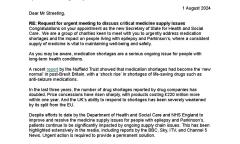This year our Helpline has been inundated with calls from people who are struggling to get their epilepsy medications, often having to travel to multiple pharmacies, only to be offered a reduced quantity of their prescription. The medicines supply chain is broken and we are calling for urgent action to fix it.
Epilepsy Society along with Epilepsy Action, Parkinson’s UK and SUDEP action are calling for an urgent review into the medicine supply chain. Medicine shortages are increasingly affecting patient care, with many essential drugs in critically short supply. Unless the issue is resolved, more patients’ health will be at risk.
There are 800,000 people in the UK with epilepsy or Parkinson’s. Access to medication is vital in ensuring that those who depend on medication are do not experience adverse effects from lack of access to medication or alternative medication that is not right for them.
Earlier this year we carried out a survey of almost 1,500 people affected by medication shortages. The survey showed:
- 70% of respondents have had difficulties getting vital medication over the past year.
- 22% report problems in the last month.
- 55% had to visit multiple pharmacies before getting hold of their medication.
- 66% were only given a fraction of the amount that was on their prescription until more supplies were available.
- 40% saw a worsening of symptoms that they attributed to the stress of trying to get their prescription filled.
- 37% of respondents with epilepsy reported having seizures induced by having to switch or skip medication.
- 36% of respondents with Parkinson’s said that facing this difficult choice led to their symptoms worsening.
For both people with epilepsy and those with Parkinson’s, around half were given a different brand or version of their medication, and 40 per cent saw a worsening of symptoms that they attributed to the stress of trying to get their prescription filled. Nearly 40 per cent of respondents with epilepsy reported having seizures induced by having to switch or skip medication, and 36 per cent of respondents with Parkinson’s said that facing this difficult choice led to their symptoms worsening.
People with epilepsy risk breakthrough seizures if they don’t have a continuous supply of medication. In severe cases, seizures can be fatal. For people with Parkinson’s, skipping medication or even delaying dose times can lead to a worsening of symptoms and serious side effects.
What we are doing
On 24th September we are holding a roundtable event at the Labour Party Conference in Liverpool to discuss why the medicines supply chain is broken and how we can fix it. The event will be chaired by Barney Calman, Health Editor at the MailOnline and Mail on Sunday and we will be joined from experts across the medicines industry including representatives from the Royal Pharmaceutical Society, the Nuffield Trust, the National Pharmacy Association, British Generic Manufacturers Association, the Healthcare Distribution Association UK and Community Pharmacy England.
The event will be an opportunity for the industry to come together and present a united front on problems and solutions which we can put before Health Secretary Wes Streeting.
Write to your MP
We will shortly be sharing a letter which you can send to your MP asking them to support our medications shortages campaign by writing to Health Secretary Wes Streeting. Watch this space for more details.
Channel 5 News People with epilepsy and Parkinson’s struggle to get their medication
Campaign updates
Labour Party Conference
Our roundtable event at the Labour Party conference was a success, bringing together experts across the medicines industry including representatives from the Royal Pharmaceutical Society, the Nuffield Trust, the National Pharmacy Association, British Generic Manufacturers Association, the Healthcare Distribution Association UK and Community Pharmacy England. The event was a great opportunity for stakeholders to share their ideas on how we can best work together to address and end issues in the medicine supply chain so that no patient is left without life-saving medicine.
It was great to engage with MPs during the conference and gather support for our call for an end-to-end review of the medicine supply chain. Since the Labour party conference we have met with MPs to discuss the campaign and 40 MPs have signed our letter that will be sent to the Health Secretary at the end of the month calling for this review. We have continued to work closely with MPs following our engagement at conference. We recently met with Rosie Wrighting MP and Taiwo Owatemi MP who are both keen to support our campaign through engaging with us and their fellow MPs to support our call for change.
Karin Smyth MP
Following the Labour Party Conference we wrote to Karin Smyth, Minister for Secondary Care. Karin Smyth acknowledged previous and existing issues with medicine supply and the impact that this continues to have on people with long-term conditions such as epilepsy. She said the Department of Health and Social Care was working closely with the NHS, the pharmaceutical industry, manufacturers and suppliers to resolve these issues.
She highlighted some of the key issues that are impacting the medicine supply chain and access to medicine. She said issues were not entirely specific to the UK and included ‘manufacturing difficulties, access to raw materials, sudden demand spikes or distribution issues and regulatory issues’.
The Minister noted that there are ‘well-established processes and tools’ to mitigate issues when they arise including ‘use of alternative strengths or forms of a medicine’.
She said steps the Department are currently taking to mitigate intermittent supply issues with some epilepsy medication include ‘directing suppliers to expedite deliveries’ which has resolved some of these issues. The Minister noted that the Department has fixed supply issues with carbamazepine 100mg/5ml oral suspension and carbamazepine 100mg and 200mg tablets.
Downing Street Letter
Our team has taken this cause to the front door of Downing Street, along with one of our incredible supporters, Chloe Christoforou. On one occasion, Chloe spent £60 in taxi fares visiting 11 different pharmacies to get her medication. Chloe, who has epilepsy, presented a letter to 10 Downing Street on behalf of the 630,000 people who live with the condition and need medication on time, at the right dose and in the right quantity.
In the letter she tells Keir Starmer: “We cannot face another year of medication shortages. Please make sure that in 2025 we get out medication on time, at the right dose and in the right quantity.”
We are grateful to Chloe for sharing her experience and for joining us as we take this issue to No.10.
HSCC Report
The UK Health and Social Care Committee has published the Government’s response to its report on Pharmacy. The Government responded to several recommendations on improving Pharmacy services in England.
The committee called for an independent review of the medicine supply chain which should be conducted as soon as possible and completed within 6 months of starting. The review should assess, and suggest ways of improving, the resilience of the supply chain, the performance and role of the MHRA and the impact of prices paid for medicines and community pharmacy reimbursement mechanisms. The Committee suggested that this review should be conducted as soon as possible and should last no longer than 6 months.
We are pleased to see that the Government has confirmed its commitment to consider the need for a review of the medicines supply chain however action is needed to mitigate and prevent risks to patients that may go without life-saving medication.
David Crompton
We recently wrote to Wes Streeting, Health Secretary following the tragic death of 44-year old David Crompton from Yorkshire. David had epilepsy and over two significant periods last year was unable to get the medication he needed to control his seizures. In December his pharmacy left him an ‘IOU’ for his epilepsy medication – carbamazepine – as they were unable to fulfil his prescription. Sadly, on 13 December, David died after falling down the stairs.
In his report, the Coroner commented: “Without his medication (David’s) epileptic condition was likely to destabilise and give rise to fits. His falls both in April and December 2024 occurred when he was left without his essential medication.
We have written to the Health Secretary to make him aware of this tragic event and to call for urgent action so that another family doesn’t have to experience this devastating loss.
What can you do?
We will continue to campaign tirelessly so that no patient has to go without life-saving medication. You can support our campaign by asking your local MP to write to Karin Smyth MP by following this link.
Charities and pharmacists call for medicine supply chain review as shortages continue
The Epilepsy Society has joined forces with other health charities and pharmacists to tell the government to fix the medicines supply chain as new data shows drug shortages are putting patients’ health at risk.
Charities call on Health Secretary to carry out urgent review of medicines supply chain
The Epilepsy Society is calling on Health Secretary Victoria Atkins to carry out an urgent review of the medicines supply chain as our own survey, carried out with other health charities, shows the struggles that people are experiencing in accessing life-saving medication.
Charities ask new Health Sec for action on medication shortages
Epilepsy Society has joined forces with other health charities to ask for an urgent meeting with the new Health Secretary, Wes Streeting, to discuss ongoing shortages of medications.




